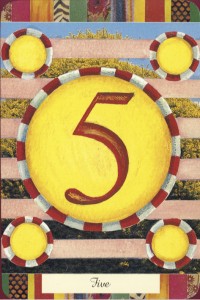Wise Livelihood
 The fifth factor of the Noble Eightfold Path is samma ajivo, translated as Wise (or Right) Livelihood. This means not earning one’s living in ways that bring harm to oneself or others, particularly if it involves killing.
The fifth factor of the Noble Eightfold Path is samma ajivo, translated as Wise (or Right) Livelihood. This means not earning one’s living in ways that bring harm to oneself or others, particularly if it involves killing.
Here’s what Phillip Moffitt has to say in Dancing with Life:
“To me, it also means not having a violent attitude in whatever you do for a living….In our time, it is not usually the profession but rather the manner in which the profession is practiced that causes wrong livelihood. For example, if you recklessly drive your car while commuting to work, or prey on the ignorance of others, or mislead or trick others in order to earn a living, you are practicing wrong livelihood.
“In my view, any job that takes away joy, whether your own or others’, also constitutes unwise livelihood, whereas any job that supports and nourishes well-being and the sense of the possibility is wise livelihood.
“Wise livelihood matters as a practice because it brings freedom to the mind now and in the future, while unwise livelihood thrusts the mind into turmoil now and plants the seed for even greater turmoil in the future.”
**
I’m retiring at the end of the month, but that doesn’t mean I’m off the hook in terms of Right Livelihood. The Pail word ajivo, which is translated here as “livelihood,” actually means something closer to “fuel for the fire of living.” So it’s not just about what one does to bring in money but, more deeply, what one does to sustain oneself. After I retire, I’ll use savings and investments to buy things and to pay my bills. But what will I do to sustain the fire of my life?
Dharma Town!
Next Up: Wise Effort
